How to Do a Press Handstand? 5 Essential Points
Author:
Reviewed by:
(21 years of Oly Lifting experience)
Unlock your full potential by engaging with our experts and community! Have questions about your fitness journey or looking for expert advice on weightlifting techniques? Don’t hesitate — leave a comment below and Oleksiy Kononov will provide a personalized answer and insights to help you reach your goals.
Torokhtiy is reader-supported. Some links are affiliate links, and we may earn a commission at no extra cost to you. See our disclosure page for details.
Being one of the key calisthenics exercises, press handstand excellent coordination of your body weight, flexibility, and strength to fulfill it from the first try. There are several stances to enter the handstand position that require quite different skills, i.e., using momentum, or by swinging, or simply kicking up. In this consistent and informative review, we’ll observe the mechanics and main peculiarities of a standard straight-arm press handstand.
You’ll finally outline how to do a press handstand by training your overall condition with proper exercises, will know the main points of its mechanics, and get tips on how to progress in this exercise in a short time.
How to do a press handstand easily? Stand in an inverted V position, shift your upper body forward to distribute the weight to your hands. Pull your legs off the floor and lift them up. Keep shoulders over your wrists. Your legs, glutes, and quads are tight.
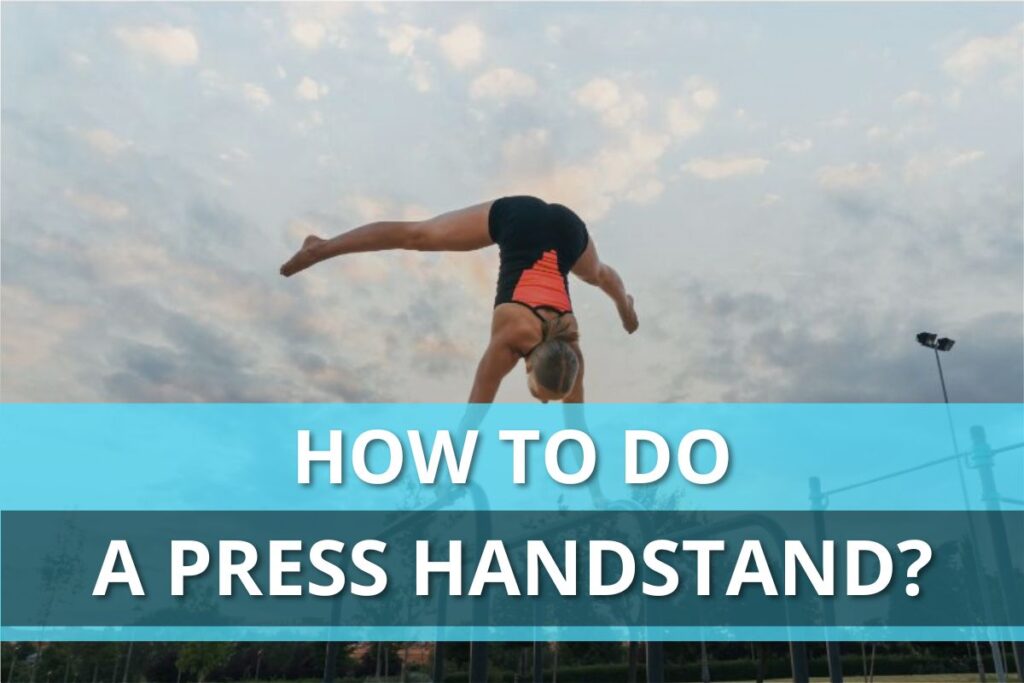
Press Handstand Benefits For Body And For Mind
If you’ve already mastered a standard handstand, why not challenge yourself and try a more complex variation like a press handstand? It’s a conventional, but more advanced bodyweight exercise that requires power, mobility, flexibility, and balance. Highly skilled and fit athletes are ready to perform this movement without hassle, however, for starters, it will become a real challenge.
Nevertheless, this exercise brings numerous perks for general health, physical condition, and psychological state too. Let’s distinguish what physical and mental advantages you’ll get when practicing a press handstand at least several times a week.
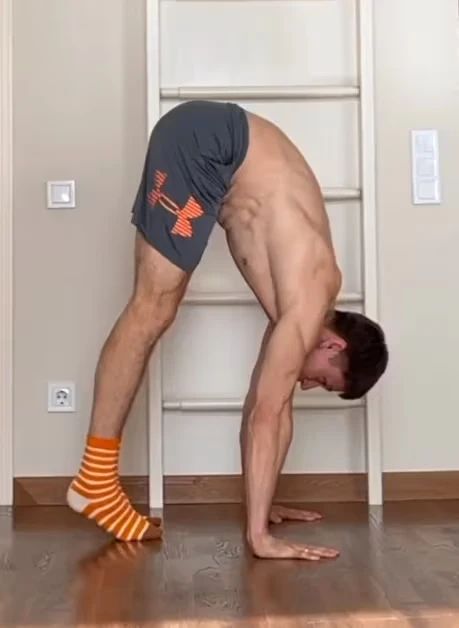
1. Physical Benefits
This exquisite exercise combines two stances, i.e. press and handstand hold, when you need to control your own weight and lift it with the help of powerful arms, shoulders, tight abs, and legs. Press handstand activates your core, hamstrings, hip flexors, and lower back dominantly, by engaging other deep muscles to stabilize your body.
✅ Enhances Flexibility
Besides the fact that this exercise requires profound flexibility, it can enhance this skill as well. Yoga enthusiasts and gymnasts practice press handstand variation which is a straddle press handstand that is performed from the seated position.
Depending on your flexibility, you can vary the angle of leaning the shoulders when starting to press yourself up and pulling your hips up to reach a straight line with your shoulders so not to lose the balance.
✅ Improve Abs Strength
The press handstand exercise involves all stabilizing muscles of your core. When doing a handstand, you need strong abdominals to lift your legs up over your head.
✅ Work Out The Whole Body
The exercise engages muscles of the entire body: shoulders, triceps, traps, deltoids, hamstrings, and glutes. Your arms and shoulders should provide most of the strength to perform a press handstand. While your abs and legs should help to stabilize your body and pull you up to the upright position.
✅ Develop Your Balance And Coordination
All press variations require good coordination and balance which is possible due to the full concentration on your movements and feeling your body. It needs to be mentioned that the notion of coordination also involves other terms like spatial awareness, movement synchronization, and adequacy.
It can be challenging to maintain the center of mass in the same place while changing the positioning of your shoulders, hips, and legs. So, you need to keep high concentration to balance your body segments.
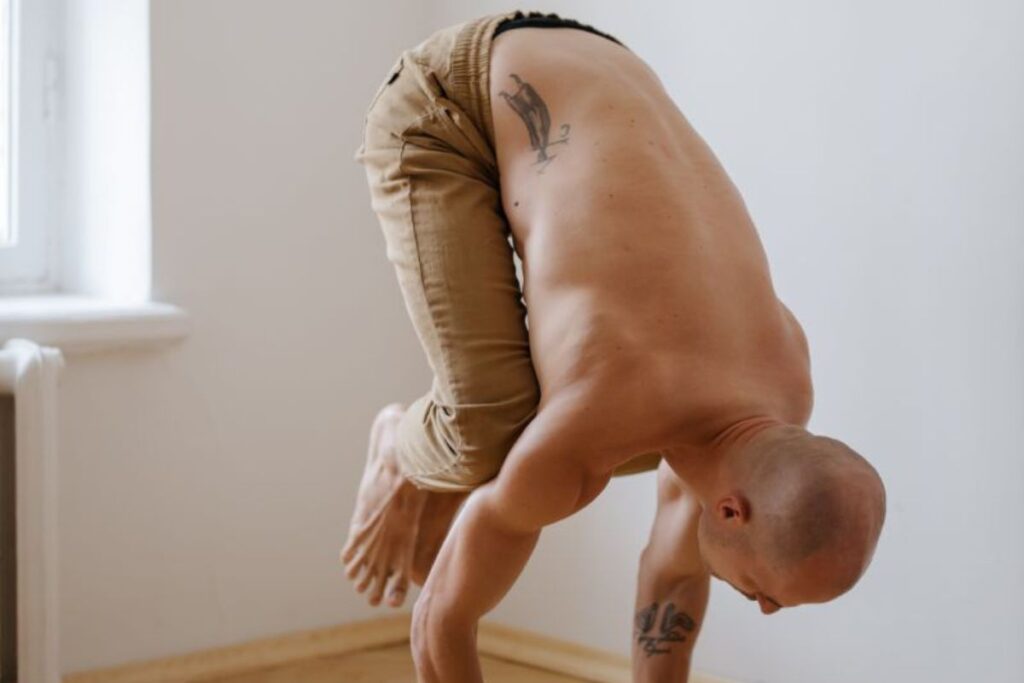
Besides that, you need to synchronize the movements of your shoulders when leaning with the movements of your raising legs to prevent collapse on the feet.
✅ Pumping Up Your Heart Rate
Despite not being a cardio exercise, turning upside down can increase your pulse which can be useful for your health. It promotes your sleep quality, and brings more motivation and confidence while eliminating all negative thoughts and tension.
2. Mental Benefits
Besides improving your body condition, balance, and strength capabilities, a press handstand exercise will enhance you control yourself both physically and mentally. It’s good for your mind and soul.
✅ Boosting Your Mood
Inverted poses that involve your head being below the heart can improve your mood and relieve you from depression and anxiety. The reason is the increased blood flow to the brain decreases cortisol levels.
✅ Making You Feel Relaxed And Calm
Yoga practitioners usually perform inversions while focusing on their inner world and energy. However, such a skill comes just after you really master handstands and can control your body and movements without thinking about how to move your hips or legs and not fall down. If you’re already strong enough to maintain stability in this position, you can relax and hold it for several minutes.
How To Do A Press Handstand Fast And Safe: A Step By Step Progression And Recommendations
The most daunting thing about doing a press handstand is not being able to press up upright and lose balance instantly. When performing the press to handstand, your hips need to move over your hands, so you can lift your feet off the ground. To direct your hips over the shoulders, it’s important to fold forward by leaning your shoulders forward, and be flexible enough, or have a lot of strength in your shoulders.
To succeed in a press handstand progression, you need to be aware of the technique and general mechanics of the exercise. That means you need to know the theory before starting to practice:
- Push and round your back to compress your body to make it shorter, consequently, your legs become longer.
- Get the hips over the shoulders by leaning forward with the shoulders.
- Follow three of these stages when doing a press handstand: toe off, L-position, and handstand.
Remember that the center of your mass needs to be above your hands. During the handstand, we perform all the movements with total control and without any accelerations to kick ourselves up rapidly. Although consider the following points when learning this exercise:
- The more you lean, the more strength the movement requires.
- The longer your legs are, the further you need to lean.
- The more flexible you are, the less you need to lean in the toe-off stage.
Taking into account the straight arm press handstand mechanics, there’s a “shoulders & hips strategy” you should know. In most cases, it can help you to perform press handstands mindfully:
- Keep the center of mass above your palms.
- While changing the body position, you need to preserve the first point by changing the position of your shoulders and hips. They should be in one relative line while pressing themselves up.
- If the shoulders lean forward too much compared to the hips, you’ll likely fall down.
Generally, you can do a press handstand from a sitting position. How to do a press handstand from this pose?
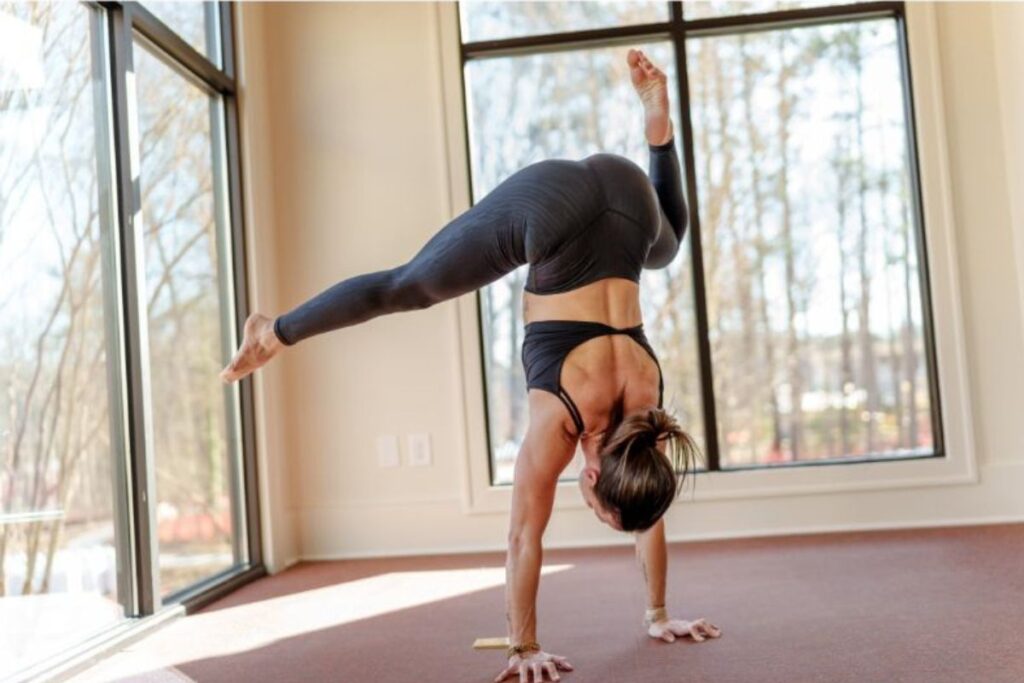
Sit on the floor, your legs wide open on the straddle, with your hands in front of you between the legs. Lean forward by transferring your body weight to the hands and start raising your legs gradually from the floor.
Control your movement, raise them until the upright position over your head to the handstand position. While you’re lifting your legs, your shoulders should move forward by passing your hands. As you’re already in the handstand position, the shoulders will return to the stacked position with your hands.
Look at the step-by-step guide on how to perform a straddle press handstand:
- Sit in a straddle pose. Keep your hands flat on the ground between your legs by spreading your fingers for more stability in the stages.
- Distribute the weight. Lean with your shoulders forward over your hands and transfer your weight from the lower body to the hands.
- Raise your legs off the ground. Engage your core to pull your legs up, meanwhile tilting your shoulders over your hands. Distribute the weight evenly on your arms while the abs muscles help you to lift the legs.
- Enter into a handstand position. Start raising your legs up until the upright position over your shoulders. You can also straddle them up or simply keep upright. Your shoulders will become one vertical line with your hands.
- Hold a handstand. Try to maintain this position as long as you can. Keep your legs and shoulders stacked. When you’re done, reverse yourself into the initial position to the straddle.
Risks Of Doing Press Handstands
We already know that a press handstand is a superb way to promote upper body strength and develop stability. You’ll also succeed to get strong abs and generally, your body becomes more shaped with correct posture and movement smoothness.
However, if you have some health problems such as shoulder, wrist, or elbow strains, refrain from this exercise, or get a consultation with a healthcare expert. Also, if you have hypertension or spinal issues, a press handstand is not for you.
Let’s look at what health issues can occur after performing this exercise wrong, or neglecting the recommendations of your general practitioner.
Follow us!
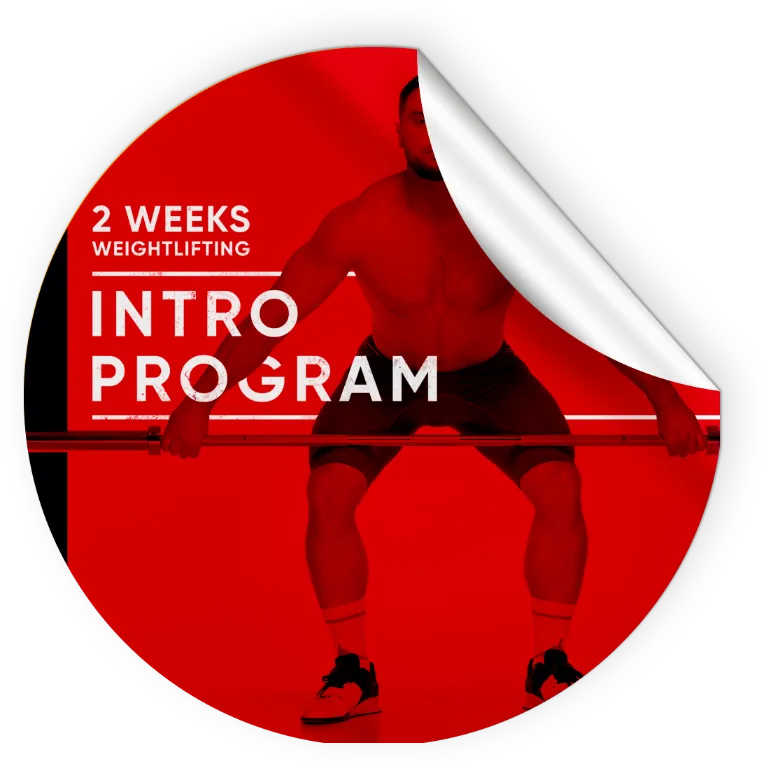
Free!
Get a 2-week Weightlifting Program as a bonus for the subscription to kickstart your training plan!

Free!
1. Shoulder Injuries And Imbalance
Because of improper performance techniques, you can get rotator cuff strain, tendonitis, bursitis, irritation, impingement, inflammation, etc. Don’t ignore the shoulder pain, as it can only make things worse. Listen to your body and move at the tempo that suits your capabilities.
Don’t neglect the state of the glenohumeral (GH) that is responsible for connecting the upper extremity to the trunk, and the acromioclavicular (AC) joint that vouches for gliding movements, i.e. scapula range of motion, shoulder abduction, and flexion. That’s why it’s important to strengthen and stretch such muscles as rotator cuffs, lats, traps, deltoids, serratus, and rhomboids.
2. Dizziness And Disorientation
If you have a poor sense of balance and coordination but are striving to do a handstand on the first try, you can feel dizzy and even lose spatial perception. So, your attempt can result in falling down with some injuries because you missed regrouping your body to collapse safely.
Also, you can get dizziness because of feeling hungry as your last meal was at least four hours before training. It’s recommended to have a full nutritious meal including proteins, fats, and carbs. But, do not overeat or have the last meal several hours before your workout as it wasn’t digested yet.
3. Vision Issues
When turning upside down, blood and lymph flow increase behind the eyes greatly, that is also called intraocular pressure. If you have some problems with vision, i.e., myopia, hyperopia, risk of glaucoma, or even retinal detachment, doing handstands can be devastating for your eye health.
How To Improve Your Press Handstands?
If you struggle how to learn a press handstand for the first time, or have some difficulties tuning up to this exercise because of improper form, understand the technique properly first. Additionally, find out which exercises and sports equipment can help you to perform press handstand easier.
You can use yoga blocks or folded-up mats to leverage yourself while practicing handstanding. Performing some strength and flexibility-centered workouts can help you to advance at handstands too. Or you can practice doing separate handstand phases and when you’ll be strong enough you’ll unite them in one smooth motion.
Exercises You Should Try To Improve Your Press Handstands
Take a look at several press handstand drills you can try to enhance your performance and get better results in handstanding in a short time.
1. V-Ups
It will strengthen your abs as this exercise also involves pulling your legs up off the ground. You need to lie on your back, with your legs together and arms extended over the head. Start lifting your legs and trunk at the same time off the ground. Touch your feet with your hands and lower your trunk back with your arms next to your ears, and legs to the ground simultaneously.
2. Push-Ups
It’s a well-known simple exercise that can train your arms greatly to be able to do a press handstand. You know what to do: get into a plank position with your shoulders over your wrists. Keep your core and butt tight, and bend your arms. You should focus on your body position and maintain control of your movement while pulling the body down. Then raise your body again by straightening the arms.
Also, you can try other exercises to get prepared for the full press handstands:
3. Pike Drag-Ups With A Forward Roll.
Get into a straight plank. Drag your feet as close to your hands as possible, by keeping straight arms. Perform a forward rollout of this position.
4. Press Handstand Muscle Memory Training.
Put folded mat panels around 8″ away from the wall and lay down on the back perpendicular to the wall, with your hands on the wall. By engaging your core, straddle your legs and move them up against the wall to touch the floor.
5. Straddle Stand And Handstand Lowers.
Start in a straddle stand by holding the weight with your hands. Slowly lower yourself down to the floor to a sitting position. Or you can start with a handstand and then lower yourself down to a straddle sitting position.
Can Children Press Handstands?
Despite being a high strength and balance-required exercise, children can perform a press handstand, especially if they attend gymnastics classes and train regularly. It needs to be said that it’s enlisted in the TOPs skill requirements. What does it mean? This is a Talent Opportunity Program in the USA that is searching for talented children, female gymnasts specifically at the age of 7-10.
The aim of the organization is to prepare strong and skilled gymnasts. That’s why the training program is focused mainly on flexibility, strength, and general conditioning. Under the permanent supervision of coaches, little girls gymnasts have to perform the following exercises as a part of the test of their physical capabilities:
lowing exercises as a part of the test of their physical capabilities:
- Press handstand: 5-10 reps.
- Handstand hold: for 30 seconds.
- Rope climb: 12′ with legs in a pike position.
- Leg lifts: 20 reps.
- Flexibility test: 6 kicks and holds.
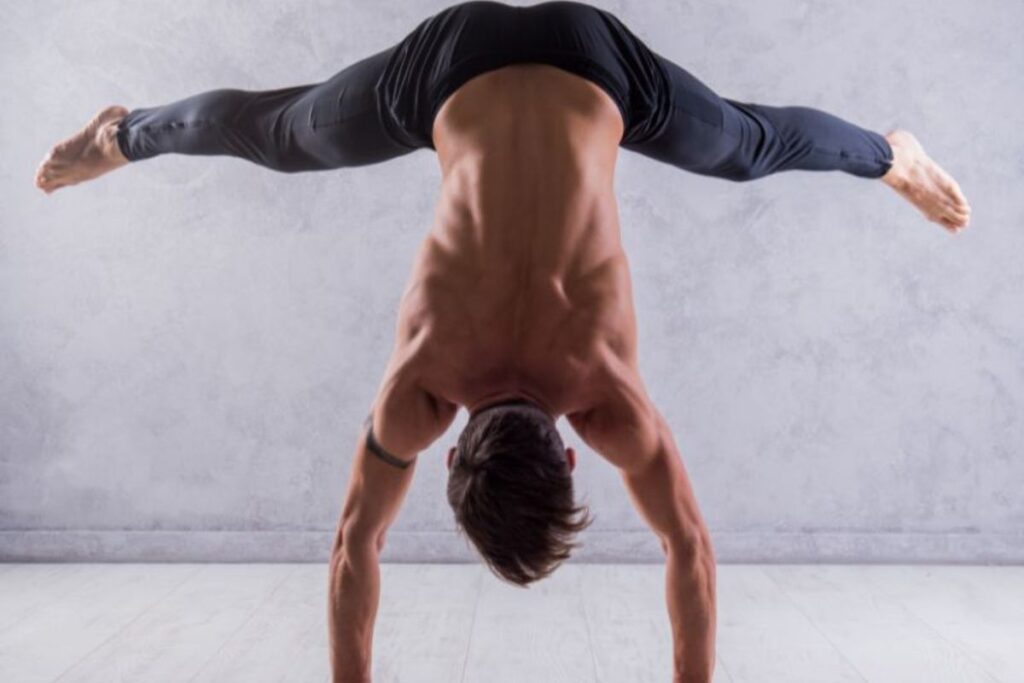
Can You Do Press Handstands If You Are New To Gymnastics?
Even if you have never tried gymnastics or yoga, this isn’t a big matter or the obstacle to doing a press handstand. Practice and dedication make progress. It can take a long time to master this exercise, even with daily practice. Some prefer doing diverse helpful exercises to improve their condition and gain physical strength and endurance. Others use the approach of tries and fall by filming themselves to see and check their technique.
With a big desire to do the press handstand and dedication to what you do, it’s possible to progress in press handstand gradually, and finally do it without stability issues or lack of physical condition.
FAQ
Do You Have To Be Strong To Do A Press Handstand?
Yes, to succeed in pulling yourself up off the floor to the upright position, you need to have strong arms and a tight core to keep your body evenly balanced. With weak arms and untrained wrists, you’ll fail to do a handstand which results in collapsing on the ground and even getting injured.
How Long To Do A Press Handstand?
It depends on your skills, namely your strength, coordination, and flexibility. If you’re a beginner, you should try to keep this position for several seconds; if you’ve already mastered this movement, increase the duration of your press handstand hold for a minute or more.
Conclusion
Thanks to the above-mentioned detailed step-by-step instructions on how to prepare, perform, and advance at doing the press handstand, we hope you’ll get more confidence in starting practicing this exercise. But, if you still have some questions regarding how to do a press handstand, or how to pump up your body to get prepared for this drill, don’t hesitate to ask us directly in the comments section.
Also read:
- How to Do a Handstand on the Wall
- Drills for Handstands
- Front Split Stretches
- Stretches for Splits
- Straddle Split
- Side Splits
- Handstand for Beginners
References:
- Bidirectional causal control in the dynamics of handstand balance // NCBI: https://www.ncbi.nlm.nih.gov/pmc/articles/PMC7801474/
- Task Specific and General Patterns of Joint Motion Variability in Upright- and Hand-Standing Postures // NCBI: https://www.ncbi.nlm.nih.gov/pmc/articles/PMC9323647/
- Kinematics and joints moments profile during straight arm press to handstand in male gymnasts // NCBI: https://www.ncbi.nlm.nih.gov/pmc/articles/PMC8279359/
- Rotator cuff related shoulder pain: Assessment, management and uncertainties // ScienceDirect: https://www.sciencedirect.com/science/article/abs/pii/S1356689X16000400
- Strategies for maintaining a handstand in the anterior-posterior direction // LWW: https://journals.lww.com/acsm-msse/Fulltext/2001/07000/Strategies_for_maintaining_a_handstand_in_the.16.aspx
- Photos by MerinoPhotos, Canva.com; cottonbro studio, Pexels; Fly View Productions; Canva.com; Eugenia, Pexels.
Why Trust Us?
With over 20 years in Olympic weightlifting, strength training, nutrition coaching, and general fitness our team does its best to provide the audience with ultimate support and meet the needs and requirements of advanced athletes and professional lifters, as well as people who strive to open new opportunities and develop their physical capabilities with us.
By trusting the recommendations of our certified experts in coaching, nutrition, and sports training programming, as well as scientific consultants, and physiotherapists, we provide you with thorough, well-considered, and scientifically proven content. All the information given in the articles concerning workout programming, separate exercises, and athletic performance, in general, is based on verified data.
The product testing process is described in more detail here.
Author: Oleksiy Kononov
Former Cirque Du Soleil Artist
Ukrainian Gymnast
More than 25 years ago Oleksiy started his sports career. He major in gymnastics which is definitely not an easy sport to go in for!
To become an athletic champion (in Ukraine, for instance, we mean here the title of “Master of Sports”) in gymnastics, one needs to spend at least 10 years and start training no later than being six years old. As for Oleksiy, he has fulfilled all the criteria.
During this period of time, definitely not short, he managed to become:
- Master of Sports, Champion of the State and International Tournaments;
- Member of the national team of Ukraine, having a perfect opportunity to train the best team ever!
- Part of Cirque Du Soleil team (as an artist).
Reviewed by: Oleksiy Torokhtiy
Olympic Weightlifting Champion, PhD in Sport Science
Best Results: Snatch – 200 kg,
C&J – 240 kg
Oleksiy Torokhtiy is a professional athlete boasting 20 years of experience in Olympic weightlifting. With multiple European and World titles under his belt, he has showcased his prowess in two Olympic Games (Beijing 2008 and London 2012). Upon concluding his illustrious career, Oleksiy dedicated himself to coaching. By 2022, he had conducted over 200 weightlifting seminars worldwide. He is the visionary behind an international sportswear and accessories brand known for its motto, “Warm Body Cold Mind.” Additionally, he is an esteemed author and the creator of a series of training programs and eBooks.

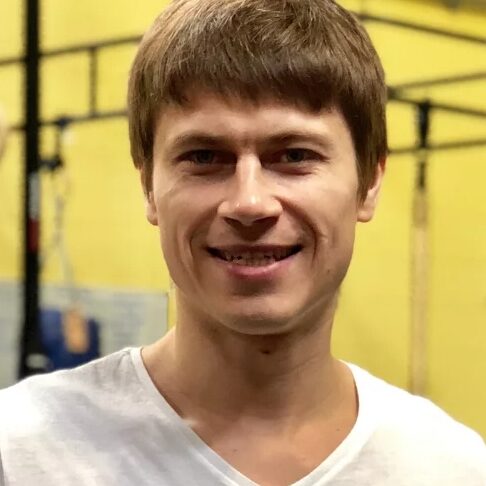
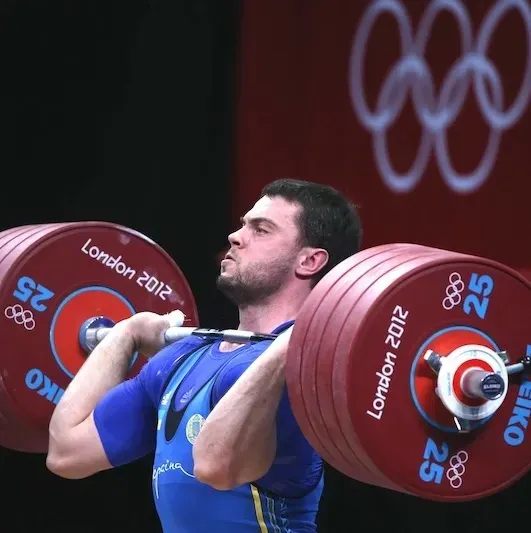

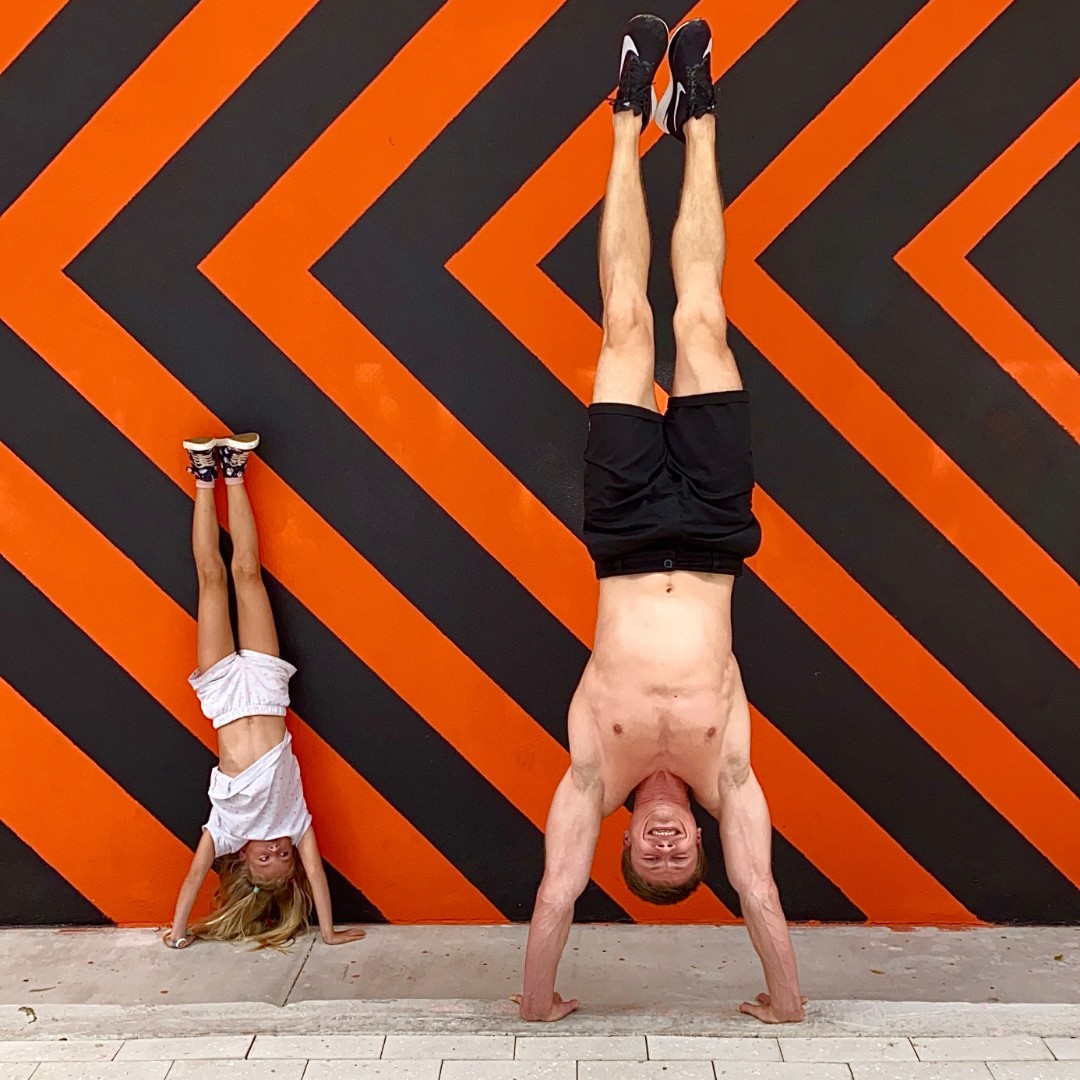
Still have questions after reading our article? Unlock your full potential by engaging with our experts and community! Don’t hesitate — leave a comment below and Oleksiy Kononov will provide a personalized answer and insights to help you reach your goals.